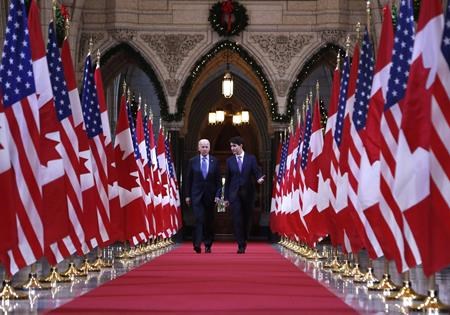Alberta
Better late than never: Trudeau finally gets a home-turf visit from U.S. president

WASHINGTON — Joe Biden’s last official visit to Canada came with a palpable sense of foreboding.
Change was in the air. Authoritarian leaders in Syria and Turkey were consolidating power. Britain had voted to leave the European Union. And Donald Trump was waiting in the wings to take over the White House.
“Genuine leaders” were in short supply, and Canada and Prime Minister Justin Trudeau would be called upon to step up, said the U.S. vice-president, who was on a farewell tour of sorts in the waning days of the Obama administration.
Six years later, Biden is coming back — this time as president — and the world is very different. His message likely won’t be.
“There’s a seriousness to this moment in America,” said Goldy Hyder, the president and CEO of the Business Council of Canada, who spent much of last week meeting with U.S. officials in D.C.
Chinese spy balloons are drifting through North American airspace. Russian MiG fighter jets are downing U.S. drones as the bloody war in Ukraine grinds on. North Korea is testing long-range ballistic missiles.
And Xi Jinping is sitting down Monday with Vladimir Putin in Moscow, a meeting that will underscore the geopolitical context in which the U.S. sees the world — and amp up the pressure on Canada to remain a willing and reliable partner, not only in Ukraine but elsewhere as well.
“It shines a much brighter light on security in all its forms: national security, economic security, energy security, cybersecurity — all of these things come home to roost,” Hyder said of that meeting.
“For America, there’s nothing more important, and there should nothing more important for us, quite frankly.”
Enter critical minerals, the vital components of electric-vehicle batteries, semiconductors, wind turbines and military equipment that both Biden and Trudeau consider pivotal to the growth of the green economy.
Ending Chinese dominance in that space is Job 1 for the Biden administration, and Canada has critical minerals in abundance. But it takes time to build an extractive industry virtually from scratch, especially in this day and age — and experts say the U.S. is growing impatient.
“The reality is, nobody’s moving fast enough, relative to escalating demand,” said Eric Miller, president of the D.C.-based Rideau Potomac Strategy Group, which specializes in Canada-U.S. issues.
More and more jurisdictions, including the European Union and U.S. states like California and Maryland, are drawing up ambitious plans to end the manufacture of internal-combustion vehicles by 2035, Miller noted.
That’s just 12 years away, while it can take upwards of a decade to get approval for a mine, let alone raise the money, build it and put it into production, he added.
“The challenge you have in a democracy is that processes are slow, and are in reality too slow relative to the needs of making the green transition,” Miller said.
“So when you when you look across the landscape, of course, you think that other people’s systems are inherently easier than your own.”
National security, too, has been top of mind ever since last month’s flurry of floating objects exposed what Norad commander Gen. Glen VanHerck called a “domain awareness gap” in North America’s aging binational defence system.
Updating Norad has long been an ongoing priority for both countries, but rarely one that either side talked about much in public, said Andrea Charron, a professor of international relations at the University of Manitoba.
“The problem for Norad is it’s literally under the political radar — it’s difficult to get politicians to commit funds and recognize that it’s been the first line of defence for North America for 65 years,” Charron said.
“Russian aggression and these Chinese balloons now make it politically salient to try and speed things up and make those commitments.”
Hyder said he expects the U.S. to continue to press Canada on meeting its NATO spending commitments, and reiterate hopes it will eventually agree to take on a leading role in restoring some order in lawless, gang-ravaged Haiti.
So far, international efforts to provide training and resources to the country’s national police force aren’t getting the job done, the UN’s special envoy to Haiti warned in D.C. as she called for countries to put boots on the ground.
“We’re not getting the job done,” Helen La Lime told a meeting of the Organization of American States last week. “We need to get down to the business of building this country back.”
Roving criminal gangs have been steadily rising in power following the 2021 assassination of president Jovenel Moïse, and are now said to control more than half of the capital city of Port-au-Prince.
Even in the face of public — if diplomatic — pressure from U.S. officials, Trudeau would rather help from a distance, investing in security forces and using sanctions to target the powerful Haitian elites fostering the unrest.
Haiti is a “complete and total mess” that can’t simply be fixed with military intervention, no matter the size of the force, Charron warned. The Canadian Armed Forces are already overstretched, facing ongoing long-term commitments to Ukraine and a chronic shortage of personnel, she added.
“Haiti is a quagmire, and nobody’s particularly keen to get in there — especially if the U.S. isn’t there to be the exit strategy.”
The question of irregular migration in both directions across the Canada-U.S. border is also likely to come up during the two-day visit, although the Biden administration is not keen to renegotiate the Safe Third Country Agreement, which critics say encourages migrants to sneak into Canada in order to claim asylum.
As well, look for plenty of mentions of the U.S.-Mexico-Canada Agreement, the NAFTA successor known in Canada as CUSMA that now provides the framework for much of the economic relationship between the two countries.
No one is keen to renegotiate that deal right now either, but they need to think about it nonetheless, Hyder said: a six-year review clause means it could be reopened by 2026.
“We all had a near-death experience a few years ago; it doesn’t seem like it was that long ago,” he said.
“And yet here we are. In a matter of a few years, we’ll be back at it again.”
This report by The Canadian Press was first published March 19, 2023.
James McCarten, The Canadian Press
Alberta
Alberta’s embrace of activity-based funding is great news for patients

 From the Montreal Economic Institute
From the Montreal Economic Institute
Alberta’s move to fund acute care services through activity-based funding follows best practices internationally, points out an MEI researcher following an announcement made by Premier Danielle Smith earlier today.
“For too long, the way hospitals were funded in Alberta incentivized treating fewer patients, contributing to our long wait times,” explains Krystle Wittevrongel, director of research at the MEI. “International experience has shown that, with the proper funding models in place, health systems become more efficient to the benefit of patients.”
Currently, Alberta’s hospitals are financed under a system called “global budgeting.” This involves allocating a pre-set amount of funding to pay for a specific number of services based on previous years’ budgets.
Under the government’s newly proposed funding system, hospitals receive a fixed payment for each treatment delivered.
An Economic Note published by the MEI last year showed that Quebec’s gradual adoption of activity-based funding led to higher productivity and lower costs in the province’s health system.
Notably, the province observed that the per-procedure cost of MRIs fell by four per cent as the number of procedures performed increased by 22 per cent.
In the radiology and oncology sector, it observed productivity increases of 26 per cent while procedure costs decreased by seven per cent.
“Being able to perform more surgeries, at lower costs, and within shorter timelines is exactly what Alberta’s patients need, and Premier Smith understands that,” continued Mrs. Wittevrongel. “Today’s announcement is a good first step, and we look forward to seeing a successful roll-out once appropriate funding levels per procedure are set.”
The governments expects to roll-out this new funding model for select procedures starting in 2026.
* * *
The MEI is an independent public policy think tank with offices in Montreal, Ottawa, and Calgary. Through its publications, media appearances, and advisory services to policymakers, the MEI stimulates public policy debate and reforms based on sound economics and entrepreneurship.
Alberta
Medical regulator stops short of revoking license of Alberta doctor skeptic of COVID vaccine

From LifeSiteNews
The Democracy Fund has announced that COVID-skeptic Dr. Roger Hodkinson will retain his medical license after a successful appeal against allegations of ‘unprofessional conduct’ by the College of Physicians and Surgeons of Alberta.
A doctor who called for officials to be jailed for being complicit in the “big kill” caused by COVID measures will get to keep his medical license thanks to a ruling by a Canadian medical regulator.
The Democracy Fund (TDF) announced in an April 4 press release that one of its clients, Dr. Roger Hodkinson, will retain his medical license after filing an appeal with the College of Physicians and Surgeons of Alberta (CPSA) over allegations of “unprofessional conduct regarding 17 public statements made in November 2020 and April 2021.”
Hodkinson had routinely argued against the dictates of public health and elected officials and “presented an alternative perspective on COVID-19, including the efficacy of masking and vaccines,” TDF noted.
In 2021, Hodkinson and Dr. Dennis Modry publicly blasted the then-provincial government of Alberta under Premier Jason Kenney for “intimidating” people “into compliance” with COVID-19 lockdowns.
In 2022, Hodkinson said that leaders in Canada and throughout the world have perpetrated the “biggest kill ever in medicine’s history” by coercing people into taking the experimental COVID injections and subjecting them to lengthy lockdowns.
These statements, among others, led the CPSA to claim that Hodkinson had promoted inaccurate or misleading information. “However, following negotiations with lawyers for The Democracy Fund, the CPSA limited its claims to arguing that Dr. Hodkinson’s comments violated the ethical code and extended beyond the scope of a general pathologist.”
Thus, Hodkinson did not “concede that any of his statements were false,” but “acknowledged that his criticisms of other physicians technically breached the Code of Ethics and Professionalism,” the group explained. “He also admitted that he should have clarified that his views were outside the scope of a general pathologist.”
Instead of having his license revoked, TDF stated that Dr. Hodkinson received a “caution” and will have to “complete an online course on influence and advocacy.”
“However, he did not concede that any of his statements were misinformation, nor did the tribunal make such a determination,” noted lawyer Alan Honner.
While Hodkinson received a slap on the wrist, a number of Canadian doctors have faced much harsher sanctions for warning about the experimental vaccines or other COVID protocols such as lockdowns, including the revocation of their medical licenses, as was the case with Dr. Mark Trozzi and others.
Some of Hodkinson’s warnings seem to have been vindicated by the current Alberta government under Premier Danielle Smith, who commissioned Dr. Gary Davidson to investigate the previous administration’s handling of COVID-19.
Davidson’s report, which was made public earlier this year, recommended the immediately halt of the experimental jabs for healthy children and teenagers, citing the risks the shots pose.
-

 2025 Federal Election2 days ago
2025 Federal Election2 days agoPoilievre to invest in recovery, cut off federal funding for opioids and defund drug dens
-

 Business2 days ago
Business2 days agoTrump threatens additional 50% tariffs on China, urges ‘patience’
-

 Alberta2 days ago
Alberta2 days agoProvince introducing “Patient-Focused Funding Model” to fund acute care in Alberta
-

 Alberta2 days ago
Alberta2 days agoMedical regulator stops short of revoking license of Alberta doctor skeptic of COVID vaccine
-

 MacDonald Laurier Institute2 days ago
MacDonald Laurier Institute2 days agoRushing to death in Canada’s MAiD regime
-

 International2 days ago
International2 days agoUN committee urges Canada to repeal euthanasia for non-terminally ill patients
-

 Energy2 days ago
Energy2 days agoEnergy group urges Trump administration to restock oil reserves
-

 Business2 days ago
Business2 days agoTrump eyes end of capital gains tax in 2025









